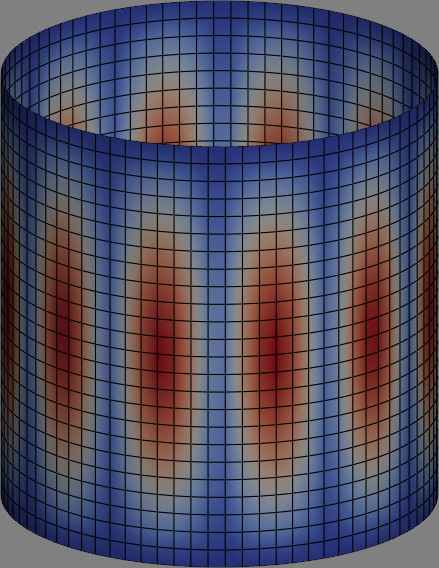Natural frequency analysis of a cylinder#
The figure below shows the first vibration mode of a cylindrical shell with CC2
boundary conditions. The figure was generated using refinement=2 and
running the script directly.

The code used to generate this figure is extracted from one of pyfe3d unit
tests:
import sys
sys.path.append('..')
import time
import numpy as np
from numpy import isclose
from scipy.sparse.linalg import eigsh, spsolve
from scipy.sparse import coo_matrix
from pyfe3d.shellprop_utils import laminated_plate
from pyfe3d import Quad4, Quad4Data, Quad4Probe, INT, DOUBLE, DOF
def test_linear_nat_freq_cylinder(mode=0, plot_pyvista=False, refinement=1):
r"""Test case from reference
Saullo G. P. Castro, Christian Mittelstedt, Francisco A. C. Monteiro, Mariano
A. Arbelo, Gerhard Ziegmann, Richard Degenhardt. "Linear buckling predictions
of unstiffened laminated composite cylinders and cones under various loading
and boundary conditions using semi-analytical models". Composite Structures,
2014. 10.1016/j.compstruct.2014.07.037
Cylinders Z11
"""
data = Quad4Data()
probe = Quad4Probe()
L = 0.510 # m
R = 0.250 # m
b = 2*np.pi*R # m
ntheta = 40*refinement # circumferential
nlength = int(ntheta*L/b)
if nlength % 2 == 0:
nlength += 1
print('ntheta', ntheta)
print('nlength', nlength)
# NOTE material proporties from Table 3 in Castro et al.
# Actual values from reference can be found here https://github.com/saullocastro/compmech/blob/e7e5342bf212743e70da22c94cc0452911099db3/compmech/conecyl/conecylDB.py#L32C34-L32C76
E11 = 123.55e9
E22 = 8.7079e9
nu12 = 0.319
G12 = 5.696e9
G13 = 5.696e9
G23 = 3.400e9
plyt = 0.125e-3
rho = 1.78e3 # kg/m3
laminaprop = (E11, E22, nu12, G12, G13, G23)
# NOTE cylinder Z11, table 3 of reference
stack = [+60, -60, 0, 0, +68, -68, +52, -52, +37, -37]
prop = laminated_plate(stack=stack, plyt=plyt, laminaprop=laminaprop,
calc_scf=True, rho=rho)
nids = 1 + np.arange(nlength*(ntheta+1))
nids_mesh = nids.reshape(nlength, ntheta+1)
nids_mesh[:, -1] = nids_mesh[:, 0]
nids = np.unique(nids_mesh)
nid_pos = dict(zip(nids, np.arange(len(nids))))
zlin = np.linspace(0, L, nlength)
thetatmp = np.linspace(0, 2*np.pi, ntheta+1)
thetalin = np.linspace(0, 2*np.pi-(thetatmp[-1] - thetatmp[-2]), ntheta)[::-1]
zmesh, thetamesh = np.meshgrid(zlin, thetalin)
zmesh = zmesh.T
thetamesh = thetamesh.T
xmesh = np.cos(thetamesh)*R
ymesh = np.sin(thetamesh)*R
ncoords = np.vstack((xmesh.flatten(), ymesh.flatten(), zmesh.flatten())).T
ncoords_flatten = ncoords.flatten()
x = ncoords[:, 0]
y = ncoords[:, 1]
z = ncoords[:, 2]
n1s = nids_mesh[:-1, :-1].flatten()
n2s = nids_mesh[1:, :-1].flatten()
n3s = nids_mesh[1:, 1:].flatten()
n4s = nids_mesh[:-1, 1:].flatten()
num_elements = len(n1s)
print('num_elements', num_elements)
KC0r = np.zeros(data.KC0_SPARSE_SIZE*num_elements, dtype=INT)
KC0c = np.zeros(data.KC0_SPARSE_SIZE*num_elements, dtype=INT)
KC0v = np.zeros(data.KC0_SPARSE_SIZE*num_elements, dtype=DOUBLE)
Mr = np.zeros(data.M_SPARSE_SIZE*num_elements, dtype=INT)
Mc = np.zeros(data.M_SPARSE_SIZE*num_elements, dtype=INT)
Mv = np.zeros(data.M_SPARSE_SIZE*num_elements, dtype=DOUBLE)
N = DOF*nlength*ntheta
quads = []
init_k_KC0 = 0
init_k_M = 0
t0 = time.time()
for n1, n2, n3, n4 in zip(n1s, n2s, n3s, n4s):
quad = Quad4(probe)
quad.n1 = n1
quad.n2 = n2
quad.n3 = n3
quad.n4 = n4
quad.c1 = DOF*nid_pos[n1]
quad.c2 = DOF*nid_pos[n2]
quad.c3 = DOF*nid_pos[n3]
quad.c4 = DOF*nid_pos[n4]
quad.init_k_KC0 = init_k_KC0
quad.init_k_M = init_k_M
quad.K6ROT = 10.
quad.update_rotation_matrix(ncoords_flatten, 0., 0., 1.)
quad.update_probe_xe(ncoords_flatten)
quad.update_KC0(KC0r, KC0c, KC0v, prop)
quad.update_M(Mr, Mc, Mv, prop, mtype=0) # consistent mass
quads.append(quad)
init_k_KC0 += data.KC0_SPARSE_SIZE
init_k_M += data.M_SPARSE_SIZE
print('elements created', time.time()-t0)
KC0 = coo_matrix((KC0v, (KC0r, KC0c)), shape=(N, N)).tocsc()
M = coo_matrix((Mv, (Mr, Mc)), shape=(N, N)).tocsc()
print('sparse KC0 and M created')
bk = np.zeros(N, dtype=bool)
# NOTE cylinders with CC2 boundary condition as decribed in Table 1 of Castro et al.
bottom_edge = isclose(z, 0)
bk[0::DOF][bottom_edge] = True
bk[1::DOF][bottom_edge] = True
bk[3::DOF][bottom_edge] = True
bk[4::DOF][bottom_edge] = True
top_edge = isclose(z, L)
bk[0::DOF][top_edge] = True
bk[1::DOF][top_edge] = True
bk[3::DOF][top_edge] = True
bk[4::DOF][top_edge] = True
middle = isclose(z, L/2)
bk[2::DOF][middle] = True
bu = ~bk
KC0uu = KC0[bu, :][:, bu]
Muu = M[bu, :][:, bu]
num_eig = max(mode+1, 6)
eigvecs = np.zeros((N, num_eig))
eigvals, eigvecsu = eigsh(A=KC0uu, M=Muu, sigma=-1., which='LM',
k=num_eig, tol=1e-5)
eigvecs[bu] = eigvecsu
omegan = eigvals**0.5
print('natural frequency analysis OK')
print('omegan =', omegan)
if plot_pyvista:
import pyvista as pv
contour_colorscale = 'coolwarm'
background = 'gray'
contour_label = 'Radial displacement'
vector = eigvecs[:, mode]
contour_vec = np.sqrt(vector[0::DOF]**2 + vector[1::DOF]**2)
displ_vec = np.zeros_like(ncoords)
displ_vec[:, 0] = vector[0::DOF]*10
displ_vec[:, 1] = vector[1::DOF]*10
displ_vec[:, 2] = vector[2::DOF]*10
intensitymode = 'vertex'
plotter = pv.Plotter(off_screen=False)
faces_quad = []
for q in quads:
faces_quad.append([4, nid_pos[q.n1], nid_pos[q.n2], nid_pos[q.n3], nid_pos[q.n4]])
faces_quad = np.array(faces_quad)
quad_plot = pv.PolyData(ncoords, faces_quad)
if contour_vec is not None:
quad_plot[contour_label] = contour_vec
plotter.add_mesh(quad_plot, scalars=contour_label,
cmap=contour_colorscale, edge_color='black', show_edges=True,
line_width=1.)
else:
plotter.add_mesh(quad_plot, edge_color='black', show_edges=True,
line_width=1.)
displ_vec = None
if displ_vec is not None:
quad_plot = pv.PolyData(ncoords + displ_vec, faces_quad)
plotter.add_mesh(quad_plot, edge_color='red', show_edges=True,
line_width=1., opacity=0.5)
#NOTE plotting coordinate system
xaxis = pv.Arrow(start=(0, 0, 0), direction=(1, 0, 0), scale=R/3)
plotter.add_mesh(xaxis, color='blue')
yaxis = pv.Arrow(start=(0, 0, 0), direction=(0, 1, 0), scale=R/3)
plotter.add_mesh(yaxis, color='yellow')
zaxis = pv.Arrow(start=(0, 0, 0), direction=(0, 0, 1), scale=R/3)
plotter.add_mesh(zaxis, color='green')
if False:
for q in quads:
pos1 = nid_pos[q.n1]
pos2 = nid_pos[q.n2]
pos3 = nid_pos[q.n3]
pos4 = nid_pos[q.n4]
centroid = (ncoords[pos1] + ncoords[pos2] + ncoords[pos3] + ncoords[pos4])/4
ze = np.array([0., 0., 1.])
zg = np.array([[q.r11, q.r12, q.r13],
[q.r21, q.r22, q.r23],
[q.r31, q.r32, q.r33]]) @ ze
normal = pv.Arrow(start=centroid, direction=zg, scale=R/6)
plotter.add_mesh(normal, color='green')
xe = np.array([1., 0., 0.])
xg = np.array([[q.r11, q.r12, q.r13],
[q.r21, q.r22, q.r23],
[q.r31, q.r32, q.r33]]) @ xe
x_axis = pv.Arrow(start=centroid, direction=xg, scale=R/6)
plotter.add_mesh(x_axis, color='blue')
ye = np.array([0., 1., 0.])
yg = np.array([[q.r11, q.r12, q.r13],
[q.r21, q.r22, q.r23],
[q.r31, q.r32, q.r33]]) @ ye
y_axis = pv.Arrow(start=centroid, direction=yg, scale=R/6)
plotter.add_mesh(y_axis, color='yellow')
plotter.set_background(background)
plotter.parallel_projection = True
plotter.show()
assert np.allclose(omegan, [1961.2284757, 1961.2284757,
2117.52282167, 2117.52282167,
2157.8876396, 2157.88763961], rtol=1e-5)
if __name__ == '__main__':
test_linear_nat_freq_cylinder(mode=0, plot_pyvista=True, refinement=2)